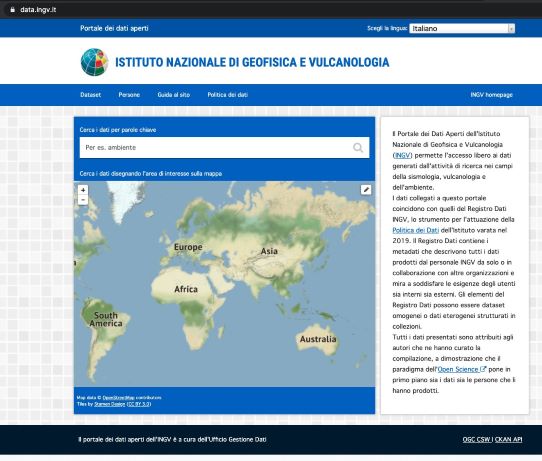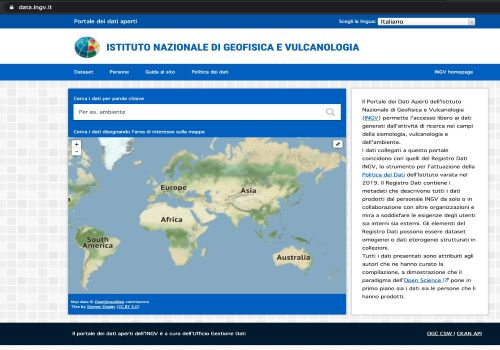Per un accesso libero, aperto, pieno e tempestivo ai dati, realizzato il Portale dei Dati Aperti prodotti dall’INGV
Il patrimonio dal valore inestimabile costituito dalle misurazioni, dai dati delle ricerche e delle relative elaborazioni, frutto del costante lavoro dei ricercatori, tecnologi e tecnici dell’INGV, considerato il più importante istituto di ricerca europeo per la geofisica, la vulcanologia e le geoscienze in generale, diventa oggi facilmente accessibile ed a disposizione di tutta la comunità scientifica e al pubblico.
La ricchezza dei contenuti del Portale lo rende uno strumento utile sia per il mondo scientifico che per tutta la comunità civile. Gli ingegneri, ad esempio, qui potranno reperire facilmente i riferimenti a ITACA, l'archivio che raccoglie le registrazioni strumentali dei più importanti terremoti avvenuti in Italia fin dal 1972, o accedere al Database della Pericolosità Sismica (MPS04) che contiene le stime su cui si basano le Norme Tecniche per le Costruzioni elaborate dal Ministero delle Infrastrutture; oppure, ancora ad esempio, gli storici che nel Portale avranno libero accesso ad informazioni e riferimenti documentali sui più grandi terremoti degli ultimi mille anni ed oltre (con i cataloghi CPTI15, ASMI e CFTI5med), sulle eruzioni dei vulcani italiani e sugli tsunami in area mediterranea (con i cataloghi EMTC e ITED) e, in generale, sugli eventi catastrofici che hanno segnato l’evoluzione economica e sociale di intere regioni.
L’apertura del Portale dei Dati Aperti (https://data.ingv.it) è frutto di un lungo percorso iniziato nel 2015. In gergo informatico questo portale viene definito come ‘metadata catalog’ ed è lo strumento chiave attraverso il quale l’INGV promuoverà la condivisione del suo patrimonio conoscitivo.
Il Portale dei Dati Aperti dell’INGV è lo strumento principale promosso dalla Politica dei Dati istituzionale, i cui principi furono formalizzati nel febbraio 2016 anche grazie all’apporto dell’esperienza maturata nell’ambito di EPOS (European Plate Observing System), Infrastruttura di Ricerca europea (ERIC, European Research Infrastructure Consortium) coordinata dall’INGV.
La realizzazione del Portale nasce sui due cardini della Politica dei Dati:
• l’istituzione del ‘Registro Dati’, uno strumento operativo per la catalogazione sistematica dei dati generati dalle molteplici ed articolate attività di ricerca e dalle reti di monitoraggio.
• la costituzione dell’Ufficio Gestione Dati a novembre 2018, coordinato da Mario Locati della Sezione di Milano dell’INGV, col compito di realizzare e gestire il Registro Dati, la sua pubblicazione in un portale web e, successivamente, di avvalersi dello stesso per supportare le altre attività di gestione e pianificazione dell’Istituto.
Il Registro Dati contiene informazioni come: la copertura temporale e spaziale, la data di pubblicazione, la versione, il tipo di licenza per la sua fruizione e tutte le altre informazioni collegate ad esso (pubblicazioni scientifiche e relazioni con altri dati). Queste informazioni, definite “metadati”, sono consultabili e scaricabili nei formati standard più diffusi nella comunità scientifica internazionale. A tutela della qualità generale e degli utilizzatori finali, tutte le informazioni pubblicate seguono una validazione tecnico-scientifica.
La ricerca di dati da parte degli utenti può essere svolta sfruttando tutti i metadati. In particolare, la ricerca può partire anche dal nome degli autori, una scelta progettuale che limita la “spersonalizzazione” dei dati, ovvero la rimozione del collegamento tra i risultati ottenuti dagli studi e le persone che li hanno condotti, riconoscendo ai ricercatori il loro fondamentale contributo.
Ogni elemento presente nel Portale dei Dati Aperti è chiaramente associato a un identificativo univoco. L’importanza di questi identificativi è strettamente legata alla riproducibilità dei risultati ottenuti, che costituisce la base stessa del metodo scientifico. Tra i diversi fattori che contribuiscono alla riproducibilità di un risultato, un posto importante è infatti occupato dall’individuazione certa dei dati utilizzati, dalla loro qualità, attendibilità e affidabilità.
Inoltre, per rendere ancora più fruibili i contenuti del portale, è anche possibile una consultazione automatizzata tramite l’uso di API (Application Programming Interface), ovvero strumenti standardizzati che permettono a software esterni di inviare richieste e ricevere risposte codificate.
Con il Portale dei Dati Aperti si vuole inaugurare lo strumento informativo per la fruizione dei dati dell’INGV: un tassello finale di un processo lungo e articolato e, al contempo, il primo passo verso una maggiore e più efficiente condivisione con tutti dei risultati della Ricerca del nostro Istituto.
Link INGV utili:
Portale dei Dati Aperti (https://data.ingv.it)
Ufficio Gestione Dati (http://istituto.ingv.it/it/ufficio-gestione-dati)
---
INGV introduces its Open Data Portal
For free, open, full and timely access to data, the Open Data Portal produced by INGV has been created
The priceless heritage consisting of measurements, research data and related processing, the result of the steady work of INGV researchers, technologists and technicians, considered the most important European research institute for geophysics, volcanology and geosciences in general, it is now easily accessible and available to the entire scientific community and to the public.
The richness of the contents of the Portal makes it a useful tool both for the scientific world and for the entire civil community. Engineers, for example, here will be able to easily find references to ITACA, the archive that collects instrumental records of the most important earthquakes that have occurred in Italy since 1972, or access the Seismic Hazard Database (MPS04) which contains the estimates on which the Italian building code elaborated by the Ministry of Infrastructures are based. Moreover, for example, the historians in the Portal will have free access to information and documentary references on the largest earthquakes of the last thousand years and beyond (with the catalogs CPTI15, ASMI and CFTI5med), on the eruptions of Italian volcanoes and on tsunamis in the Mediterranean area (with the EMTC and ITED catalogs) and, in general, to the catastrophic events that have marked the economic and social evolution of entire regions.
The opening of the Open Data Portal (https://data.ingv.it) is the result of a long process that began in 2015. In IT jargon, this portal is defined as a 'metadata catalog' and is the key tool through which INGV will promote the sharing of its knowledge heritage.
The INGV Open Data Portal is the main tool promoted by the institutional Data Policy, the principles of which were formalized in February 2016 also thanks to the contribution of the experience gained in the context of EPOS (European Plate Observing System), European Research (ERIC, European Research Infrastructure Consortium) coordinated by INGV.
The creation of the Portal was born on the two cornerstones of the Data Policy:
• the establishment of the 'Data Registry', an operational tool for the systematic cataloging of data generated by the multiple and complex research activities and monitoring networks.
• the establishment of the Data Management Office in November 2018, coordinated by Mario Locati of the Milan Section of the INGV, with the task of creating and managing the Data Registry publishing it on a web portal and, subsequently, of using it to support other management and planning activities of the Institute.
The Data Registry contains information such as: the temporal and spatial coverage, the date of publication, the version, the type of license for its use and all other information related to it (scientific publications and relationships with other data). This information, defined as “metadata”, can be consulted and downloaded in the most popular standard formats in the international scientific community. To protect general quality and end users, all published information follows a technical-scientific validation.
User may search data taking advantage of all these metadata. In particular, the search for data may start from the name of the authors, a design choice that limits the "depersonalization" of the data, that is the removal of the link between the results obtained from the studies and the people who conducted them, recognizing the researchers’ fundamental contribution.
Each element present in the Open Data Portal is clearly associated with a unique identifier. The importance of these identifiers is closely linked to the reproducibility of the results obtained, which forms the very basis of the scientific method. Among the various factors that contribute to the reproducibility of a result, an important place is in fact occupied by the reliable identification of the data used, their quality, accuracy and reliability.
In addition, to make the contents of the portal even more usable, automated consultation is also possible through the use of APIs (Application Programming Interface), that are standardized tools that allow external software to send requests and receive well-formatted responses.The Open Data Portal introduce a convenient tool to locate and use data made by INGV: a final step in a long and complex process and, at the same time, the first step towards greater and more efficient sharing of the Research outcomes of our Institute.
Useful INGV links:
Open Data Portal (https://data.ingv.it)
Data Management Office (http://istituto.ingv.it/it/ ufficio-gestione-dati)





